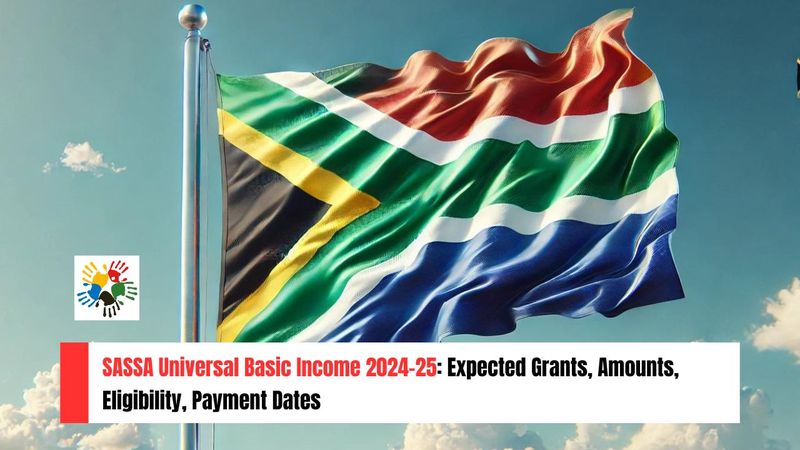The South African Social Security Agency (SASSA) has long been a crucial support system for people in need, providing various social grants. As we approach 2025, there is significant anticipation for a new development: the introduction of the Universal Basic Income (UBI).
This initiative aims to provide financial stability for all citizens, ensuring a minimum income level for everyone. This article will explain the expected grants, amounts, eligibility criteria, and payment dates related to the SASSA Universal Basic Income 2025.
Universal Basic Income (UBI) Introduction
The UBI is a proposed program that will provide regular financial support to all citizens, regardless of their employment status. The goal is to help reduce poverty and inequality in South Africa. The UBI is a step forward from the existing Social Relief of Distress (SRD) grant, which was introduced as a temporary measure during the COVID-19 pandemic. The government is now considering making the SRD grant permanent and more inclusive under the UBI scheme.
Expected Grants and Amounts
The UBI represents a major shift in South Africa’s social support system. The exact amount of the UBI has not been finalized, but initial discussions suggest that it could range between R800 and R1,200 per month. This amount is designed to cover basic needs such as food, shelter, and healthcare.
The UBI will likely replace the SRD grant and may also work alongside other social grants like the Child Support Grant and the Old Age Pension. This means that while the UBI will be a new addition, it will complement the existing support structures provided by SASSA, ensuring a comprehensive safety net for all citizens.
UBI Eligibility Criteria
One of the key features of the UBI is its universal approach. Unlike other targeted grants, which require specific conditions to be met, the UBI is intended to be available to all South African citizens and permanent residents. This broad inclusivity aims to simplify the process and ensure that everyone benefits from the program.
To qualify for the UBI, individuals will need to prove their citizenship or permanent residency status. Unlike the SRD grant, which required proof of financial distress, the UBI does not require recipients to show their income level. This approach ensures that everyone, regardless of their financial situation, receives a basic level of financial support.
UBI Application Process
Even though the UBI is designed to be inclusive, there will still be an application process to ensure that all eligible individuals are registered. SASSA plans to simplify this process by using digital platforms to make it easier for people to apply. Applicants will need to provide their identification documents, proof of residency, and bank account details so that the funds can be directly deposited.
For those who do not have access to digital platforms, SASSA will keep physical offices open where people can apply in person. Additionally, outreach programs are expected to help ensure that people in remote or marginalized communities are aware of the UBI and can access it.
UBI Payment Dates
For the UBI to be successful, it is important that payments are made regularly and predictably. SASSA is committed to ensuring that UBI payments are distributed monthly. A fixed payment date each month will help recipients plan their finances more effectively.
The exact dates for UBI payments will be announced as the program gets closer to being implemented. It is likely that SASSA will choose a date in the middle of the month to avoid clashing with other social grant payment schedules. This approach helps prevent delays in receiving payments and ensures that the banking system can handle the volume of transactions smoothly.
Potential Impact on Society
The UBI has the potential to bring significant positive changes to South African society. By providing a guaranteed income, the UBI can help reduce poverty levels and improve the quality of life for many people. This additional income can stimulate local economies as recipients spend their funds on necessary goods and services.
The UBI can also give individuals a financial safety net, allowing them to pursue further education, start small businesses, or seek better job opportunities without the immediate worry of financial hardship. This could lead to broader economic growth and development in the country.
Challenges and Considerations
Despite its potential benefits, implementing the UBI comes with challenges. Funding such a program requires substantial financial resources. The government will need to explore various ways to fund the UBI, such as reallocating existing social grant budgets, increasing taxes, or seeking international aid.
Another important consideration is the need for efficient administrative systems to manage the distribution of funds and prevent fraud. SASSA will need to invest in technology and infrastructure to ensure that the UBI operates smoothly and transparently.
Conclusion
The SASSA Universal Basic Income 2025 represents a bold and forward-thinking step towards financial security for all South Africans. By transitioning the SRD grant into a more inclusive and permanent UBI, the government aims to provide a stable foundation for people to improve their lives.
While there are challenges to address, the potential benefits of the UBI make it an exciting initiative that could transform the social welfare landscape in South Africa. As 2025 approaches, more details about the UBI will emerge, offering hope for a more equitable and prosperous future for everyone.
